Students fight for news literacy
By Patrick Hamilton pthamilt@my.loyno.edu
Students from Loyola’s Bateman team are wrapping up a year-long campaign in which they have been fighting disinformation and educating students across campus about the importance of news literacy.
Every semester the Bateman team goes head-to-head in a national competition with schools across the country to promote a predetermined campaign through unique, tactful, and clever strategies that will make the largest impact in their communities. The competition’s sponsor will then use the strategies from the most successful campaigns to support their own missions. This year the News Literacy Campaign, a non-profit, nonpartisan organization focused on educating students on real news, was the competition’s sponsor.
Alexis Parrino, a public relations junior who was part of the campaign this year, said the team started working on the campaign in November, working through the holidays, Thanksgiving, Christmas, and Mardi Gras, to ensure their campaign is something they could be proud of.
“Our team has been working to host educational and fun events, posting on various social media platforms with helpful infographics, interviewing industry professionals, researching topics about and related to misinformation, and tabling to help spread awareness,” Parrino said.
Loyola’s Bateman team plans to submit their own plan book to the News Literacy Project, containing the team’s most successful strategies and ideas, according to Parrino.
The Reunion works to celebrate and amplify the Black community on campus
By Maleigh Crespo macrespo@my.loyno.edu
Psychology sophomore Morgan Love said she feels Black spaces are limited being a Black student at Loyola, a predominantly white institution.
“It is extremely important and vital to cater to our students, our Black students,” she said.
This is the mission that seniors Robert Morrison III and Destiny Sanders had when they set out to create the week-long series event titled, The Reunion, held Feb. 28 through March 4 to celebrate Black culture.

Sanders said they wanted to highlight Black history & culture at Loyola because even as a PWI, it’s incredibly diverse compared to other small colleges.
“We have a lot of minorities on campus. And it’s very evident,” she said.
After getting their start in creating
Black experiences through the Student Government Association, Morrison and Sanders said they realized they needed to create spaces for the Black community outside of SGA.
“We wanted to amplify the Black experience through organizations that have worked really hard on this campus to create space for themselves,” Morrison said.
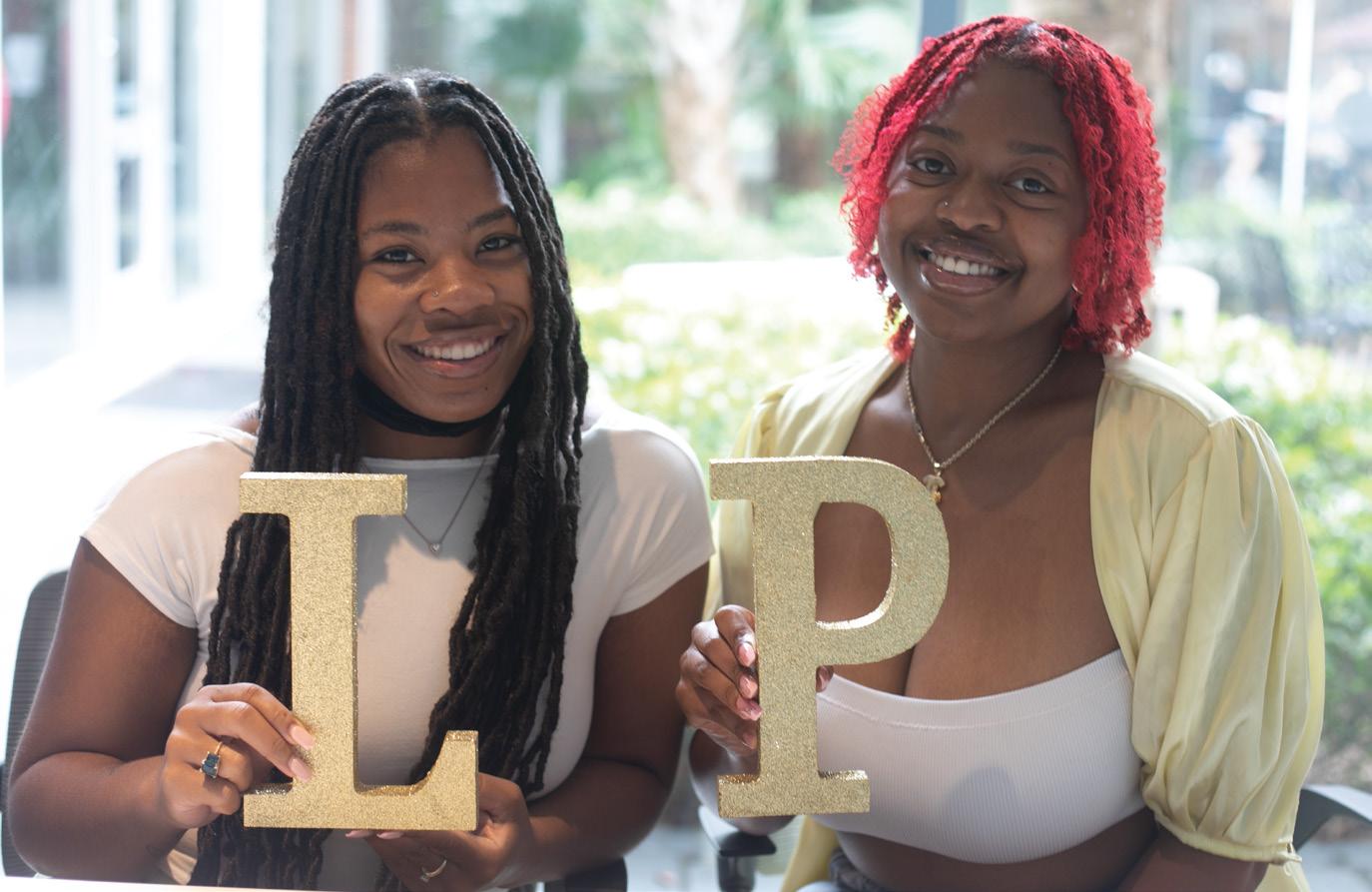

The seven-day project had ten events hosted by different Black student organizations, including the Black Student Union, National Pan-Hellenic Council, Lemon Pepper, A La Mode, L.O.V.E., Caribbean and African Student Association, and the Loyola chapter of the National Association for the Advancement of Colored People.



History senior and Lemon Pepper director of operations Faith Hogg said that a lot of times in the world, in society, and sometimes, on our campus, it can feel like Black voices are often overlooked.
Three years ago, Hogg started the one-night-only art exhibit and showcase “BLACK IS ART” to highlight Black artists on campus. This year, the event was hosted under the collection of events in The Reunion.
“It’s something that highlights Black artists, but it’s a space that is welcome and open to everybody,” Hogg said. “You can experience their world and hear their voices and give agency to Black people, but it’s for everybody to experience.”
Neuroscience sophomore Ashleigh Laws said having Black spaces on campus is important because you know that when someone’s coming to support you, they’re coming to support you, and not just because you’re in a white space that you’re allowed to be in.
See REUNION, page 2
“The effects of disinformation on students are bigger than we think. Students are the ones that will keep the world turning in the future and if they aren’t able to differentiate what is true from what is fake, it can create chaos,” said mass communication sophomore Julia Bueno, who is also working on the campaign. Bueno said it’s important for students to know how they can find credible sources and avoid those that aren’t. Otherwise, she said, it will become difficult to distinguish opinion from fact.
And fake news has been on the rise. The amount of fake news identified by independent fact-checkers from 2019 to 2020 almost doubled. And in 2022, disinformation efforts pushing anti-vaccination falsehoods, election fraud allegations, and economic conspiracies about inflation and gas prices gained enormous traction.
“Teens and adults need to be aware of how bad things can get if we start trusting any sources we find. It will destroy our democracy and increase problems amongst those who believe it and spread it,” Bueno said.
Political science professor Sean Cain gave a presentation about the importance of news literacy at one of the Bateman team’s events and discussed the important role news-literate students have in protecting democratic institutions.
See LITERACY, page 2
NEWS 2 | CRIME MAP 3 | PUZZLES 4 | WORLDVIEW 5 | LIFE & TIMES 6 | SPORTS 9 | EDITORIAL 10 | OPINION 11 FIND US ONLINE AT LOYOLAMAROON.COM FB.COM/THELOYOLAMAROON @LOYOLA_MAROON @LOYOLA_MAROON
For a greater LoyoLa Loyola University • New Orleans • Volume 101 • Issue 06 • March 10, 2023
THE MAROON
Von LaRae and Ann Leyla Surena pose for the A La Mode fashion show on March 1. The show was the sixth event of the week-long series. Sophia Maxim/The Maroon
Morgan Love looks through handmade clothing by artist China Dix at the “BLACK IS ART” showcase on Feb. 28th. The showcase was one of ten events of The Reunion. Maleigh Crespo/The Maroon
Imani McGowan and Bria Permenter smile at Lemon Pepper’s yellow party on March 2. Lemon Pepper is invite-only and based on academics and campus involvement. Maleigh Crespo/The Maroon
LITERACY: Students fight against fake news
Biever hall residents fined for vandalism
Students who reside in Biever Hall are being fined for vandalism and graffiti found in the stairwells, according to an email sent by interim community director of Biever Hall Aaron Johnson.
The email said the vandalism occurred during the Mardi Gras holiday, and Biever Hall will be fined for the cost of cleaning and painting the walls after the graffiti’s removal.
The fine is being split $10 per resident.
It was not specified what was inscribed, but Johnson said in the email that he was saddened by the phrase graffitied in the stairwell.
“I thought that the culture and community that was established early on this academic year were rooted in togetherness and sense of purpose,” he wrote. “I hope that we can return to that sense of purpose that was originally established and strive to be a community for all.”
Loyola student arrested in dining hall
Continued from page 1
“Non-engagement reduces accountability for the people in political power. When the news media fails to keep tabs on those in power, and when citizens are unable or unwilling to try to do so too, the government can become unresponsive to the problems people face or, worse, become corrupt,” Cain said.
Junior public relations major Sophie Bornefeld also worked on the campaign this year. She said young adults have a responsibility to fact-check their information before circulating it among their friends and family. Likewise, she said it's just as important to understand the information and consider it from every angle before we formulate our opinions.
And Cain agrees. He said students becoming informed about local issues and being open to sharing their knowledge with friends, family, and neighbors is a form of community service.
Studies show that Americans have more trust in local news organizations than in national media corporations. But news literate citizens must fight even harder to get relevant, local information as news media companies struggle to survive financially. In Louisiana, newspaper circulation decreased by 40% between 2004 and 2019.
As a result, the number of so-called “news deserts” – communities with limited access to credible, comprehensive news and information that feeds democracy at the grassroots level – has rapidly
increased.
Cain explained the growing distrust in the media through three sets of data from General Social Surveys and Gallup which demonstrated a trend of low trust in government, low trust in mass media, and low trust in others. The lack of trust indicates a pattern of people withdrawing confidence in public institutions.
“The gap in political awareness, or news literacy, accelerates the partisan polarization in the national government because elected officials care more about the concerns of those citizens who are most aware of what they do than they do about those who are less regularly informed about the government,” Cain said.
However, the ever-changing news
market has presented an opportunity for groups like the Bateman team to educate larger audiences and fight misinformation by innovating clever, new digital communication strategies.
“I think that our campaign is making a difference and encouraging students to fact-check any information they see. We have worked so hard to get our information out and make a real impact on the student body,” Parrino said. “No one wants to be misinformed when having a serious discussion on important topics, so I think this matter is important to everyone. Overall, I think Loyola students care about being news literate, just as much as we, the Bateman team, do.”
REUNION: Week long event amplifies black voices
Continued from page 1
One of the numerous events hosted in The Reunion was an R&B paint ‘n’ sip hosted by L.OV.E. Morrison said it felt like Black excellence flowing all around, which was beautiful to witness.
“It just really made me feel like we are doing something special with this,” he said.
L.OV.E., which stands for Living Our Vision Everyday, is chartered under The National Association for Colored Women’s Clubs. L.OV.E. president Tori Hardy said, “We create an opportunity for Black women to come together and to just be themselves.”
It’s a beautiful organization that supports Black women on campus, but it doesn't get the traction it deserves, Morrison said. So one of the main pillars of the event was to amplify those organizations, he said.
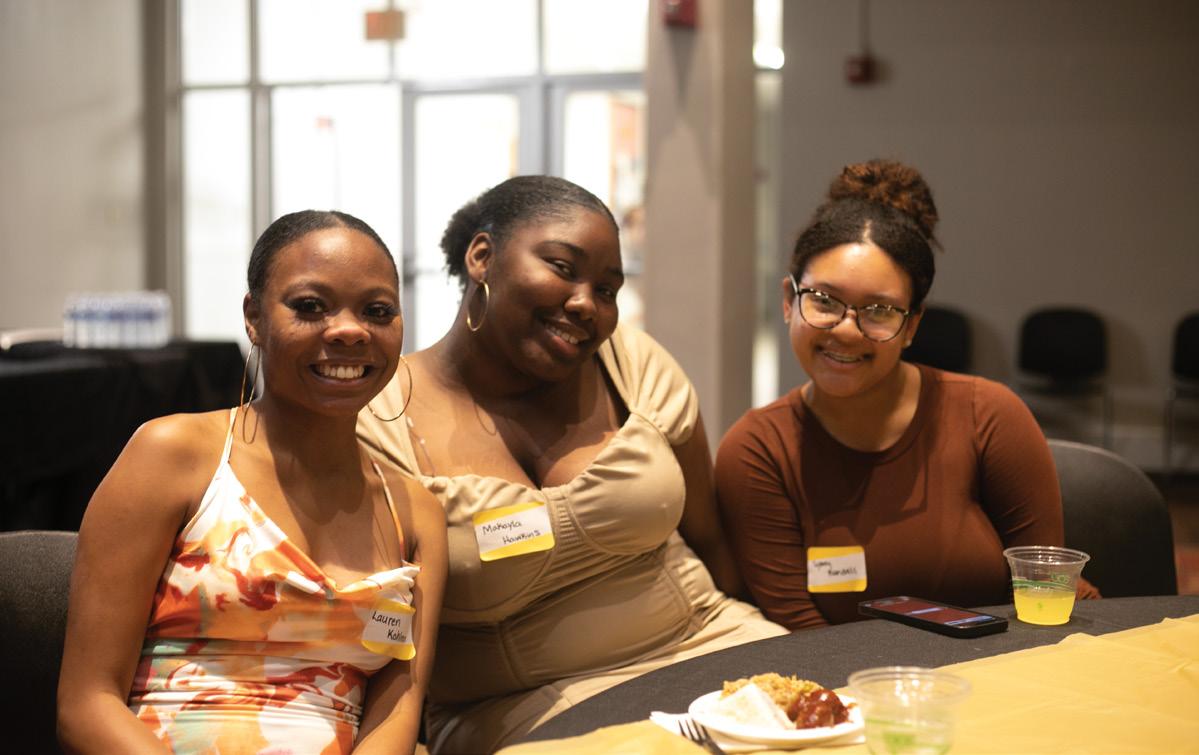

Vice president of the office of equity and inclusion Kedrick Perry said it's always important to have these events as a way for students to share their culture and experiences with each other.
“This is how we build bonds, build inclusion, and create a sense of belongingness,” he said.
Loyola’s NPHC hosted a stroll-off, which is a competitive strolling event. For many historically Black sororities
and fraternities, strolling is a cultural tradition of group dancing, created to promote unity and power.
“We had a ton of people from Panhel, the National Panhellenic Conference, and IFC, the Interfraternity Council, come and support us at the stroll off, which just touched me because they're not a part of NPHC, but just taking the time to come and support us and learn more about organizations really matters,” Sanders said.
Sanders also pointed out that hosting these events not only creates safe spaces for people of color, but also for non-BIPOC students to use as a learning opportunity.
“We wanted the week to be fun, of course, but we also wanted it to be intentional and educational, as well,” she said.

Sanders said she gets emotional when she sees how students are being reached in ways she never thought by just having representation.
“You realize that things you’re doing are bigger than yourself,” she said.
As for the future of the event, Sanders said she hopes it continues throughout the years to come as something that is hosted during Black History Month and organized by different Black student organizations.
Morrison said the committee had
underclassmen shadow upperclassmen throughout the entire process to ensure that as people moved on, there would be students ready to fill the empty roles.
“This year was the building block, but the goal for future years is creating a larger noise around the week of events and getting a bigger turnout,” Morrison said.
Perry said the Office of Equity and Inclusion is proud to take on whatever role will be most beneficial to The Reunion in the future, but its fate is ultimately up to
the students.
“This is what the school needs: to serve all of the students and to ensure that we all feel welcome and can enjoy ourselves,” Morrison said.
Sanders said she will never forget the countless students who came up to her, who said they felt like they had a space on campus to be their authentic selves and where they could showcase their Blackness, even if it was just for a week.
Loyola University student Luke Sahs was arrested on March 2 in the Orleans Room by the New Orleans Police Department.
Sahs was booked on a count of stalking at 8:50 p.m., according to the Orleans Parish Inmate Query.
According to LUPD, a student filed a report accusing Sahs of stalking. Loyola police said Sahs was in possession of chemical materials that can be used to kill people. LUPD said they believe he will be brought up on terroristic threat charges as well.
LUPD said Sahs made social media posts about the student who filed the report, spreading personal information about them such as the individual’s nationality and family.
NOPD arrived at Buddig Hall to arrest Sahs before his roommate told police he was in the Orleans Room, LUPD said. According to Loyola police, there were no issues during the arrest.
Sahs is now in police custody at the New Orleans Police Department 2nd district.
Chapel construction expected to resume in May
After several months of halted construction, the building of the new Loyola chapel is planned to resume. The Tom and Gayle Benson Jesuit Center is now expected to finish near the end of spring in 2024, according to an email sent by Interim university president Father Justin Daffron, S.J.
Construction will resume this May, he said, and the school expects disruptions on campus and in the surrounding neighborhood will be “minimal,” as the loudest portion of the project has already been completed.
Originally, construction was expected to be completed in the spring of 2023. However, Daffron said, issues with the cost and acquisition of materials caused delays.
Daffron said the school had signed a contract with MAPP LLC and the company is currently gathering materials.
“The university has remained committed to building this chapel and center that will transform our campus and be a place of beauty, joy, and inspiration for people of all faith backgrounds,” Daffron said.
NEWS 2 March 10, 2023 THE MAROON
The 2023 Bateman team (from left to right) Anna Hummel, Julia Bueno, Aja Cousins, Alexis Parrino, and Sophie Bornefeld pose for a photo after the media and politics event on Thursday, March 2. The Neutral Ground Side campaign have hosted events across campus educating students about news literacy. Patrick Hamilton/The Maroon
Lauren Kohlman, Makayla Hawkins, and Sydney Randall socialize at the Black Diaspora Social hosted by the Caribbean and African Student Association on March 3. Maleigh Crespo/The Maroon
STAFF


FRERET ST
ST. CHARLES AVE
CLAIBORNEAVE S. CARROLLTON AVE BROADWAY ST TULANE LOYOLA
NASHVILLE AVE JEFFERSON AVE
NAPOLEONAVE
CRIME MAP LEAKEAVE
MAGAZINE ST
Adviser’s Office (504) 865-3295
Correspondence maroon@loyno.edu
Executive Producer: Chloe Caudle
Assistant Editors: Anna Hummel, Maria DiFelice, Nadir Benslimane, Kincaid Leger, Alana Thompson, Veronica Offner, Ella Michna

Distribution Manager: Abigail Schmidt
Digital Team: Hannah Bauer, Addison Laird, Dajah
Saul Adviser: Michael Giusti
CONTACT US
Main Office (504) 865-3535
Business Office/Advertising (504) 865-3536




Letters to the editor letter@loyno.edu
Advertising ads@loyno.edu
Website www.loyolamaroon.com
Twitter @loyola_maroon
Facebook The Maroon
Instagram @loyola_maroon
Our office is in the Communications/Music Complex, Room 328.
Send mail to: The Maroon, Loyola University, Campus Box 64, 6363 St. Charles Ave., New Orleans, LA 70118
The Maroon is published every Friday. Unless otherwise
noted, all content is copyrighted by The Maroon. All rights reserved. First copy free to students, faculty and staff. Every additional copy is $1.00. The Maroon is printed on 30 percent post-consumer recycled content.

THE MAROON March 10, 2023 2
PARKAUDUBON
Drug Violation Cabra Hall Feb. 28 9:05 p.m. Theft Danna Student Center March 3 7:13 a.m.






PUZZLES 4 March 10, 2023 THE MAROON
ACROSS
on "The Good Doctor"
Actor on "FBI"
"__ Boys for Life"; Will Smith film
Suffix for persist or exist
"Law & Order: __ by Jury" (2005-06)
Ending for text or infant
__ Lupino
Freeway exits
Devious 18 "Play Misty __"; Clint Eastwood film 20 Rob or Will 22 Max Thieriot series 26 Become inedible 27 Distress signal 28 Lunch order, for short 29 As crazy __ loon 32 Televised again 35 "So Help Me Todd" actor 39 "__ of Fortune" 40 Ghostly figure 42 "Law & Order: Organized Crime" role 43 "The __"; 2004 Dennis Quaid movie 47 Refrain syllable 48 Role on "The Conners" 49 Actor Sal 50 "__ This Old House" 51 Circulatory or digestive: abbr. 52 Take __ off; sit down 53 "__ No Evil, Hear No Evil"; 1989 film DOWN 1 Explorer Eriksson
"Seeking a Friend for the __ the World" 3 Creator of Pong & other video games 4 Actress Meryl 5 Retirement acct. 6 Actor Alastair
1 Role
4
9
12
13
14
15
16
17
2
dance styles
Merlin
Mary-Kate
Small restaurant
Kirstie's family 11 Actress Susan & others
"__. Doubtfire"
Sesame & Easy: abbr.
"G.I. Joe: The Rise of __"; 2009 film 24 Edmonton hockey player 25 Prefix for violet or sound 29 Judd or Benson 30 Coils of yarn 31 Thumbs-up vote 33 "__ as It Gets"; Nicholson film 34 Ultimate degree 36 Andes animal 37 Smidgens 38 Hospital patient's cry 39 Spider creations 41 Veronica or Ricki 44 "Diamond __"; Mae West play 45 Year south of the border 46 __ culpa For weekly puzzle answers, download The Loyola Maroon Mobile App Apple Store Google Play
7 One of Ben Vereen's
8
or
9
10
19
21
23
Loyola program works to overturn wrongful convictions
By Ava Acharya aaacharya@my.loyno.edu @avaallene
In a state that holds the highest global rate of incarceration, one Loyola-based program is working to address failures of justice in the Orleans Parish criminal system.
The case review project, created by the Jesuit Social Research Institute in cooperation with the Orleans Parish District Attorney’s Office’s civil right’s division, combines the efforts of students and professionals to review the sentences of people who have previously moved through the system.
Of the people who have moved through the sentencing review system in Orleans Parish, 226 people have been released from prison after having their cases reviewed. Of these 226 people, 125 were previously serving life sentences without the possibility of parole, according to Annie Phoenix, executive director of JSRI.
“The work has had a profound impact,” said Bidish Sarma, an assistant district attorney in Orleans Parish and a research fellow with JSRI.
Sarma said he has personally been able to involve both undergraduate and Loyola law students in the program through his position at the research institute. Involvement with the program provides students with hands-on opportunities to learn about historical and modern practices in criminal court.
Working alongside Loyola law stu-
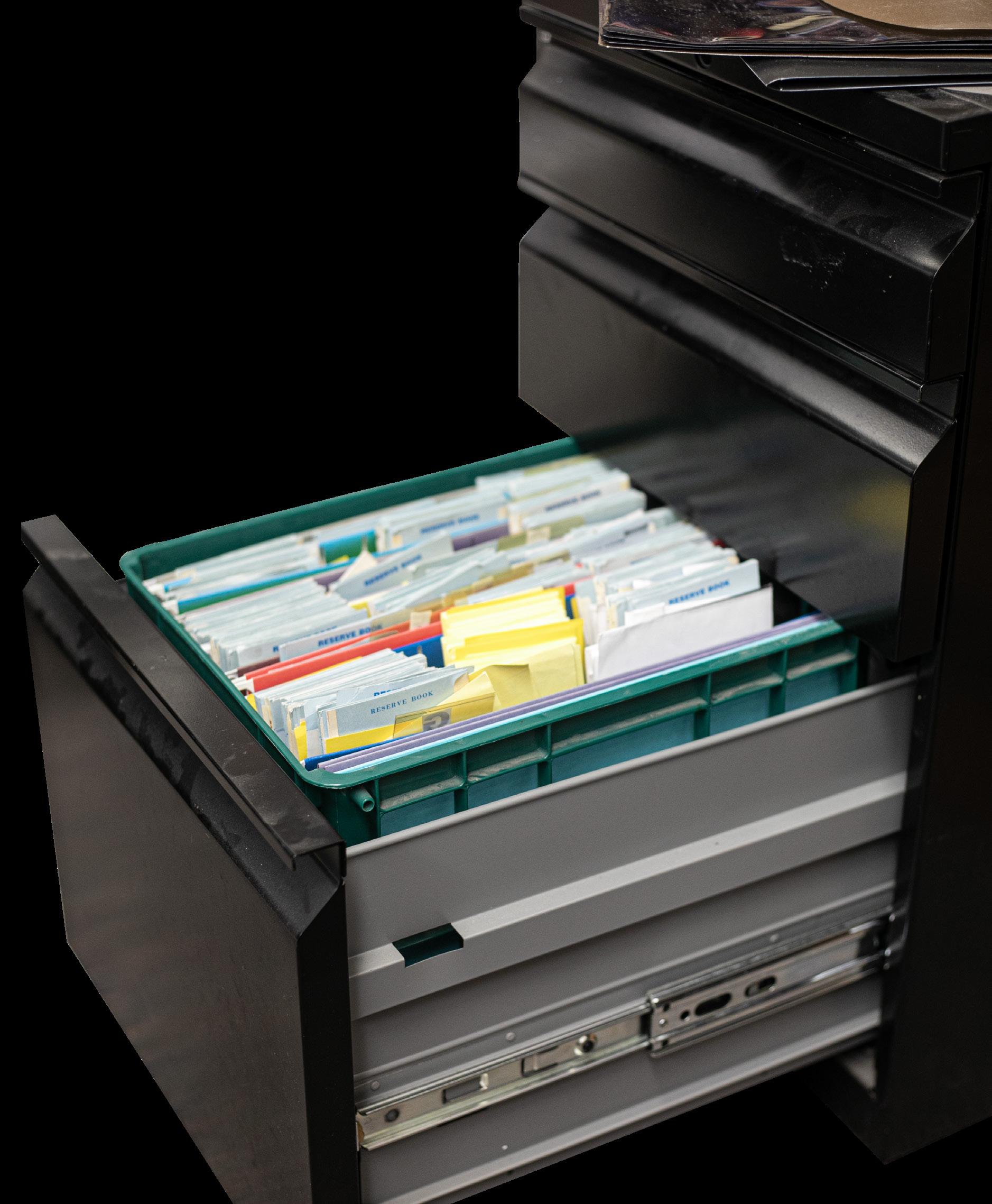
dents and other team members involved with the Civil Rights Division of the Orleans Parish DA’s office, Sarma analyzes previously resolved cases in order to determine wrongful conviction and unjust punishment.
Often, he said, these are cases from several decades ago in which defendants are still incarcerated.
Two million people are incarcerated in the United States as of 2022, according to the Prison Policy Initiative. Between 80,000 and 120,000 of these people were wrongfully convicted, according to the Georgia Innocence Project.
“Our divisions aims to confront past harm and injustice, and increase the transparency and accountability of criminal justice officials,” Sarma said.
The only downside to the program, Phoenix said, is it is not more widespread and accessible across the state and country, as not every district attorney is willing to participate in a program that may reveal previous injustice.
Currently, the program is only accessible to those who have been sentenced within the Orleans Parish criminal system. This is in part due to Orleans Parish having a progressive district attorney, Phoenix said. She further credited everyone who helped to
elect the current Orleans Parish district attorney, Jason Williams, as partially responsible for the case review program’s success.
“JSRI is really proud of everything that the Civil Rights Division has been able to accomplish,” Phoenix said.
Former superintendent speaks on the search process for a new NOPD chief
By Jackie Galli jegalli@my.loyno.edu @jackie_galli
Amidst a mayoral recall effort, crime surge, what many have said is an understaffed police force, and unstable mayoral city council relations within the city, the search for a permanent police chief could be difficult, according to former superintendent Ronal Serpas.
As the city stands, Michelle Woodfork has served as interim police chief for three months now, following the resig-
nation of former superintendent Shaun Ferguson in 2022, and her contract is set to expire in April.
Serpas, who was superintendent of the New Orleans Police Department for four years before coming to Loyola to teach criminology in 2014, said that it can be difficult to be an interim chief.
“When there’s an interim CEO, there tends to be inertia, so that’s something superintendent Woodfork can’t control,” he said.
Woodfork previously worked in NOPD’s Management Services Bureau,
and also headed the alternative police response unit after being promoted by Serpas while he was superintendent.
She is the first Black woman to serve as superintendent, with her uncle, Warren Woodfork, being the first Black man to hold the position from 1985 to 1991. It is uncertain whether or not Woodfork will assume the position permanently.
The city chose the International Association of Chiefs of Police to lead and conduct a search for the next NOPD superintendent back in late January, which they said would take 15 to 17 weeks once it began. The city said the search was expected to begin in February of this year, but nothing has been said publicly about if that was the case.

“Right now, whether it be Woodfork or whomever, New Orleans needs stability,” Serpas said. “Not having stability is adding to the complications of the problems that are being experienced by the people throughout the city who are being robbed, raped, murdered, shot, survived shootings, died from shootings, don’t feel safe with their children going to college, don’t feel safe going to storesit’s just, stability is what’s needed to start forging a path forward.”
Part of that path forward includes a qualified permanent police chief. Serpas said whoever would be the successful candidate should be someone who has already been a police chief in a reasonably sized city.
“New Orleans is not a place where now would be the best time to take a chance on someone who has not had
an opportunity to show significant senior-level leader experience,” he said.
Serpas related the search process for a new superintendent to the search process a university goes through for a president, such as Loyola’s current situation.
“Is the president of the university going to be someone who has never been a president before? Of course, that’s gonna happen sometimes. But if you're a university that’s in crisis or you're a police department in crisis, right now is probably when you wanna find somebody who has already demonstrated the chief executive officer experience necessary to translate that into what the city needs,” he said.
Serpas said he has been a chief who was externally chosen several times and also worked to choose chiefs. There are three major areas that potential applicants to the position will be looking at.
“Candidates are looking, first and foremost, at the reality of the community they are going into. What’s the mayor’s position in relation to the community? What’s the mayor's position relative to the council? Candidates think about these things because that’s where the resources come,” Serpas said.
After that, Serpas said candidates look at the status of the department.
“What’s its staffing level? What are the technology advantages and challenges? What are the recruitment and retention challenges and advantages?” he said.
Then, they consider weaknesses in crime reduction.
“Are there failings of detective function? Are there failings of reactive policing versus proactive policing?” Serpas said.
With all of these considerations in mind, Serpas said New Orleans might not look stable to many potential candidates.
“To come to New Orleans today, you don’t have a stable mayor, you don’t have a stable community, you don’t have a stable council relationship with the mayor, so I think those would be very significant distractions for candidates right now who would want to take the big leap to be in the place for you to have to make bold changes,” he said.
This begs the question: what type of candidate would be drawn to head a department for a city in crisis?
“On a personal level, I returned to New Orleans in 2010 because it exactly was a police department crisis,” Serpas said. “It was my hometown, and I wanted to be part of the reformation of the organization. Brand new mayor, brand new police chief, brand new city council. An absolute focus by everybody at the federal, state, and local levels that we were gonna make changes in the New Orleans Police Department. That was enticing to someone like me who had been a chief for 12 years, ten years, or whatever it was.”
Woodfork didn’t respond to The Maroon’s multiple phone and email inquiries.
WORLDVIEW 5 March 10, 2023 THE MAROON
A police cruiser is parked in front of NOPD's first district police station. It is still up in the air who will become the permanent superintendent. Arianna D'Antonio/The Maroon
“JSRI is really proud of everything that the Civil Rights Division has been able to accomplish.”
— Annie Pheonix Executive Director of the Jesuit Social Research Institute
“Our divisions aims to confront past harm and injustice, and increase the transparency and accountability of criminal justice officials."
— Bidish Sarma Assistant district attorney in Orleans Parish
Maleigh Crespo/The Maroon
TAD production wins Big Easy Award
Arianna D'Antonio asdanton@my.loyno.edu
After months of hard work to make "Head Over Heels" something to remember, Loyola's Theatre and Dance Department took home the Big Easy Award for Best University Theatre Production. Chair of the Theatre and Dance Department C. Patrick Gendusa said "Head Over Heels" was a special show that became near and dear to everyone in the
department.
“It makes our hearts smile to receive recognition for a production that had such an impact here at Loyola and impacts the audiences in every production around the world,” he said. “It is about acceptance and love of all kinds. We love to spread love and joy. We certainly did it with ‘Head Over Heels’ and are honored to be recognized in the NOLA community.”
Junior musical theater major Gabby
Santalla, who played the role of Gynecia in “Head Over Heels,” felt honored that the department has been recognized.
“We worked incredibly hard on such an amazing show that has a really beautiful message behind it,” Santalla said.
“To see our work get recognized and the show itself be appreciated is just a really beautiful feeling.”
Nominees are made by members of music, theater, dance, and classical arts committees in recognition of achieve-
New blog highlights the weird faces behind music
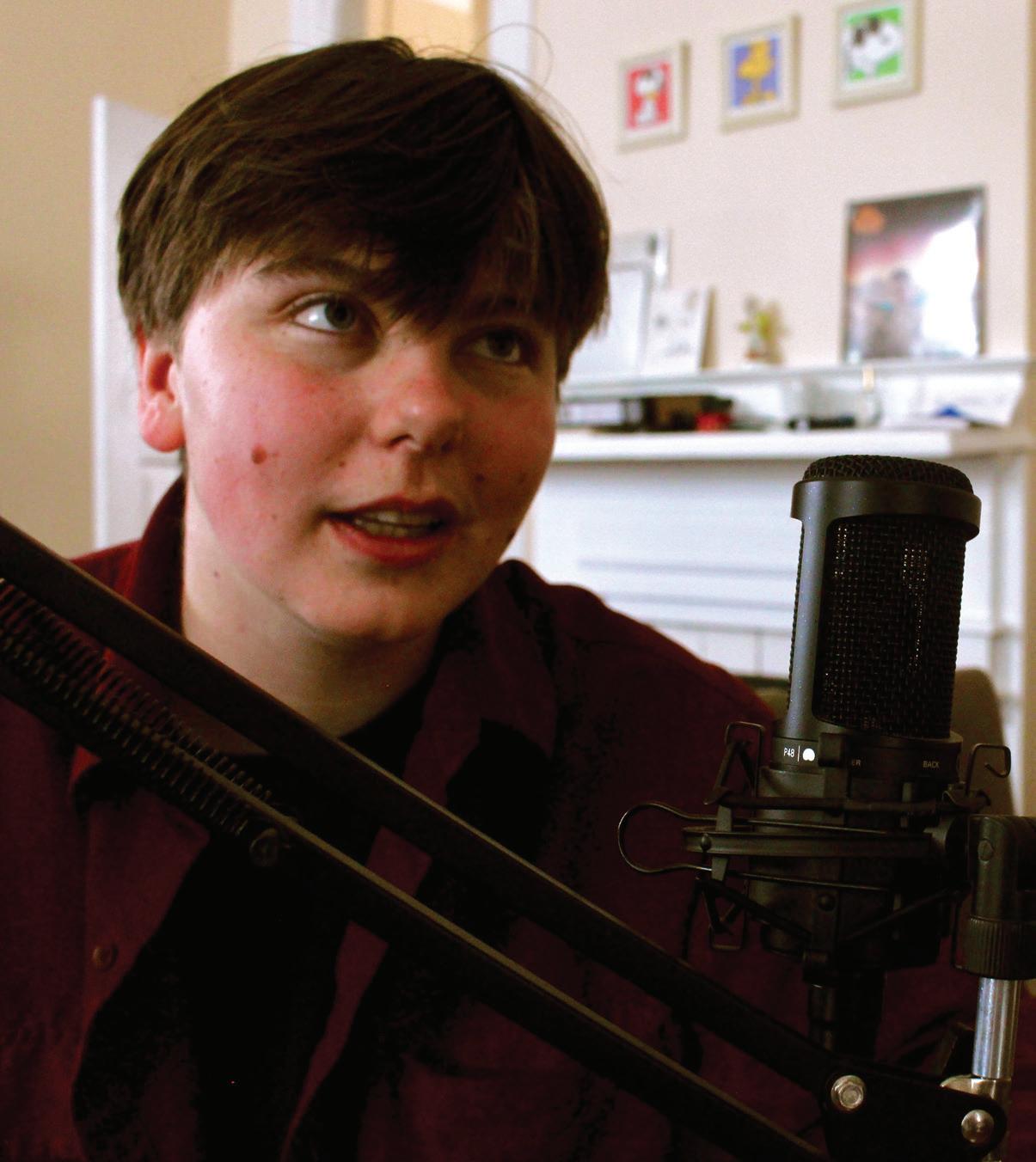 By Sofia Mongillo smmongil@my.loyno.edu
By Sofia Mongillo smmongil@my.loyno.edu
In searching for ways to shed light on artists that they feel don’t get the attention they deserve, music industry senior Owen Baekey and Loyola graduate Teddy Tietze began their blog, Weird Face.
Centered around the music community in the New Orleans and Baton Rouge areas, the blog was created this spring to highlight artists by curating playlists that include independent musicians, feature articles, and a podcast that discusses music topics and offers music tips to new and upcoming artists.
Being musicians themselves, the two crafted the idea of Weird Face after finding themselves in various conversations focused on the lack of recognition for artists deserving of more attention.
“Weird Face came about because Teddy and I couldn’t stop talking—and arguing— about music on our own time,” Baekey said. “We kept saying we needed to find a way to capture the discussions we were having, so we decided to create a platform where we could take our conversations and opinions and turn them into something we could share with everyone, while also giving a platform to the artists whom we believe deserve one.”
Focusing especially on self-managed
artists, Tietze and Baekey said they shared a vision of wanting more for local musicians trying to make their break.
“A lot of the national focus on New Orleans is centered around jazz since it’s historically a very jazzy place, and funk sometimes too,” Tietze said. “When people come to visit New Orleans, they flock to watch predominantly jazz performances. That’s great, but there are also so many other artists that deserve more attention.
Baekey, a Connecticut-native rapper, and Tietze, an indie rock artist from California, said they each have vastly different tastes and perspectives regarding the world of music.
“It’s great that we have different experiences and backgrounds because it allows us to have a wider spectrum of the things we're covering,” Tietze said. “I’m mostly covering indie and alternative stuff and the live scene around that, and Owen is covering hip-hop and R&B because those are the circles we surround ourselves in.”
Baekey said being a musician gives him the upper hand in terms of artists’ respect when it comes to being a music
blogger.
“I know the blood, sweat, and tears that people put into their craft and art, and I strive to be as respectful and accurate as possible when I write about someone. As an artist myself, I know how difficult it can be to get people to hear your music, and all I want is to give a platform to the artists who really deserve it,” he said.
In an effort to get the word out about Weird Face, the duo hosted a launch party on Jan. 20 where students and New Orleanians alike gathered for drinks, music, and a good time.
“I feel the house party scene in New Orleans, at least among college students, hasn’t quite been revived since COVID-19, and it was refreshing to be at a truly sick party,” English major Aubrey McClaran said. “Both Teddy and Owen are so talented, and are really immersed in their respective music scenes, but because the music they make is so different, it’s really cool to see them collaborate on a project like Weird Face. It’s bringing two polar sides of the New Orleans music scene together.”
ments made in 2022, according to Gambit.
The Theatre and Arts Department won the 2022 Gay Appreciation Critics’ Choice Award for Best Musical for “Head Over Heels” and housed two other productions that won Gay Appreciation awards, including “Pantomime” presented by Crescent City Stage and “Clothes for a Summer Hotel” by the Tennessee Williams Theatre Company of New Orleans.
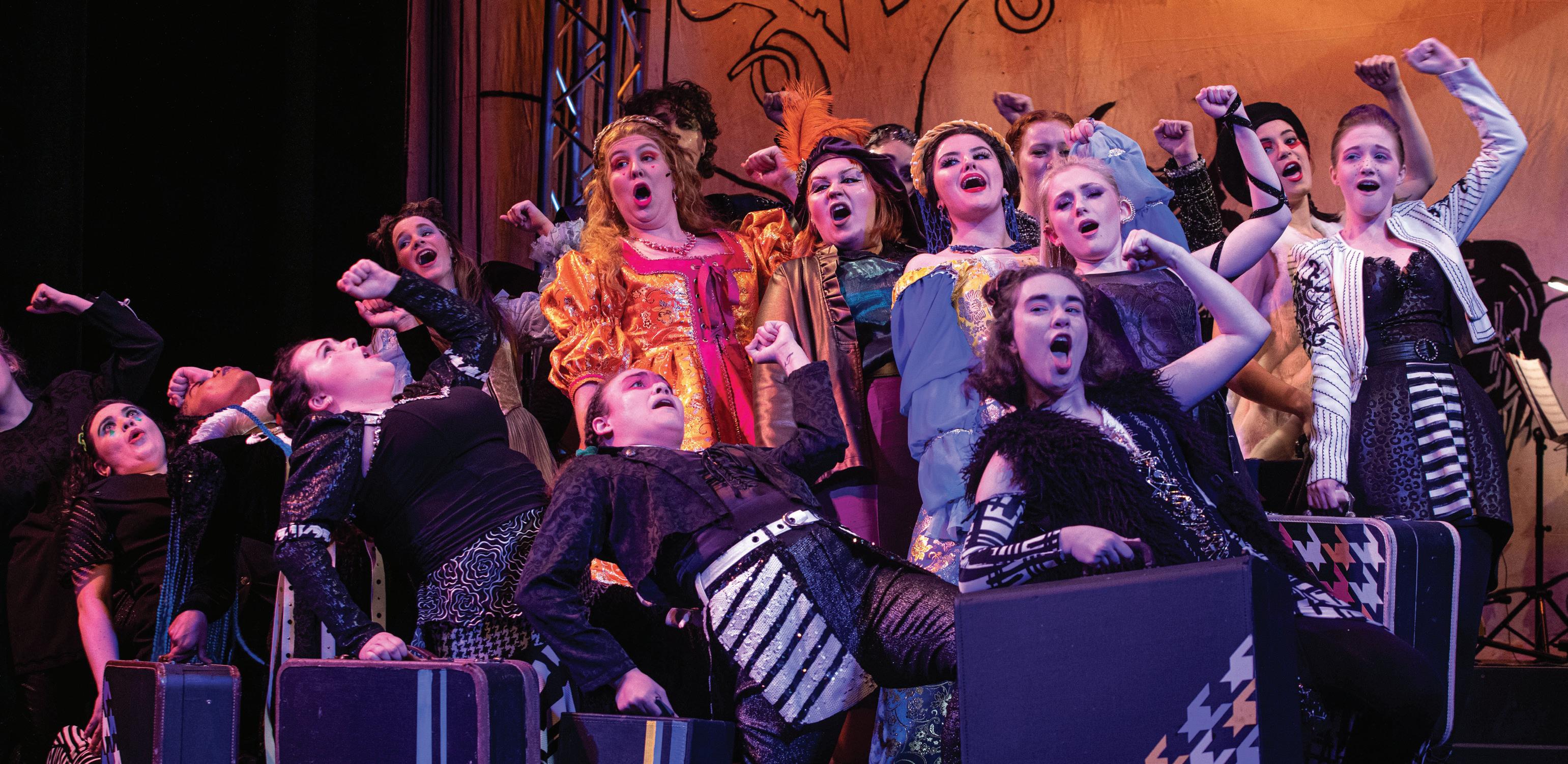
Theater arts junior Steven Pendleton said that as a transgender, queer person, the story of “Head Over Heels” meant the world to them.
“'Head Over Heels’ makes a bold, loving statement that society should evolve alongside its people, and people shouldn't be forced to change for society. Seeing the New Orleans community recognize all of the vibrant queer joy in this show fills me with hope, gratitude, and happiness,” Pendleton said.
LIFE & TIMES March 10, 2023 THE MAROON Film • Arts • Food • Music • Leisure • Nightlife 6
The Theatre and Dance Department performs "Head Over Heels" in Loyola's Marquette Theater in April 2022. This show won a Big Easy Award and a Gay Appreciation Award. Staff Photo
Weird Face co-founder Teddy Tietze conducts an interview with an artist. He and music industry senior Owen Baekey started the blog with hopes to help rising musicians gain traction. Taylor Falgout/The Maroon
“All I want is to give a platform to the artists who really deserve it.”
— Owen Baekey Co-founder of Weird Face blog


MARDIGRASfor the MINDtm march 9 | 10 | 11 2023 THE NEW ORLEANS BOOK FESTIVAL will bring the world’s leading authors to TULANE UNIVERSITY’S uptown campus for a multi-day celebration! This FREE festival will provide an opportunity for authors and readers to interact with each other in one of the most vibrant and culturally diverse cities in the world. Be sure to join us for FAMILY DAY at the fest on SATURDAY, MARCH 11! Visit bookfest.tulane.edu for the 2023 author lineup and updates! bookfest.tulane.edu @nolabookfest Bookit!

8 March 10, 2023 THE MAROON
Men's team falls short of consecutive national titles
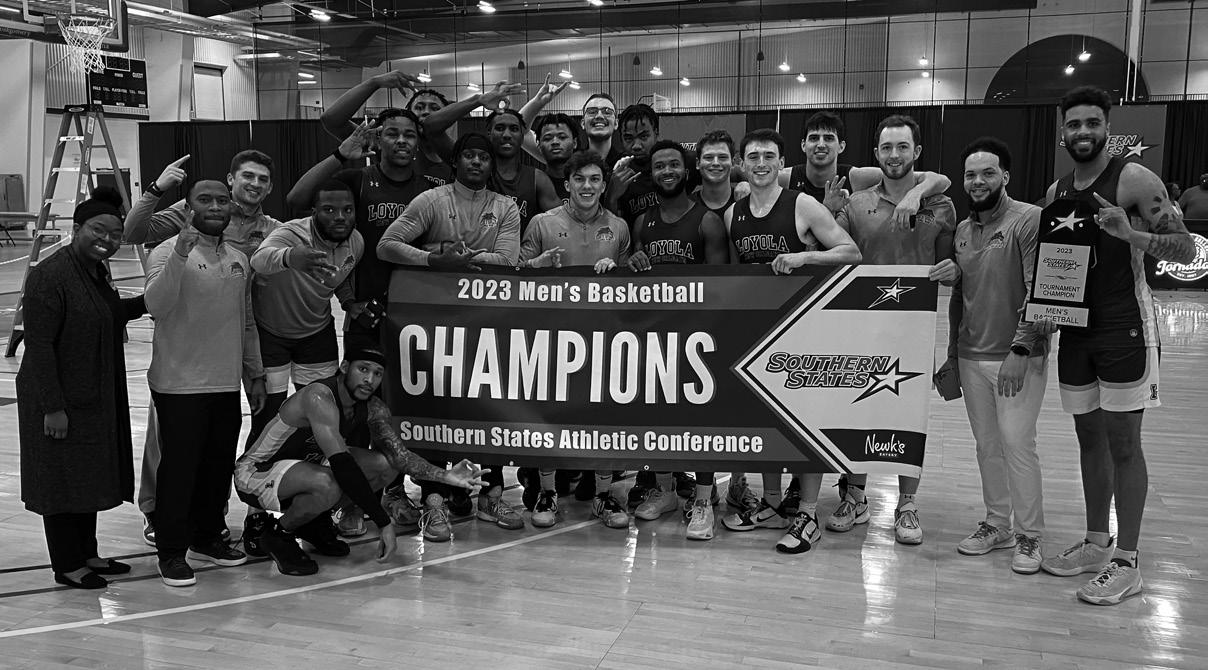
 By Jane Wright jswrigh2@my.loyno.edu @janewriight1
By Jane Wright jswrigh2@my.loyno.edu @janewriight1
The men’s basketball team is out of the running for the national championship after their losing during the first round of the conference 82-71 against the Southern Assemblies of God University Lions. Despite this early loss, the team still has achievements to be grateful for.
The team won 24 games this season, a number reached only twice before in program history back in 1945 and 2022.
The Wolf Pack also entered the Den with a 4-game winning streak and No. 3 seed in the conference.
“We took a lot of strides in the right direction during the conference tournament,” Harden said.
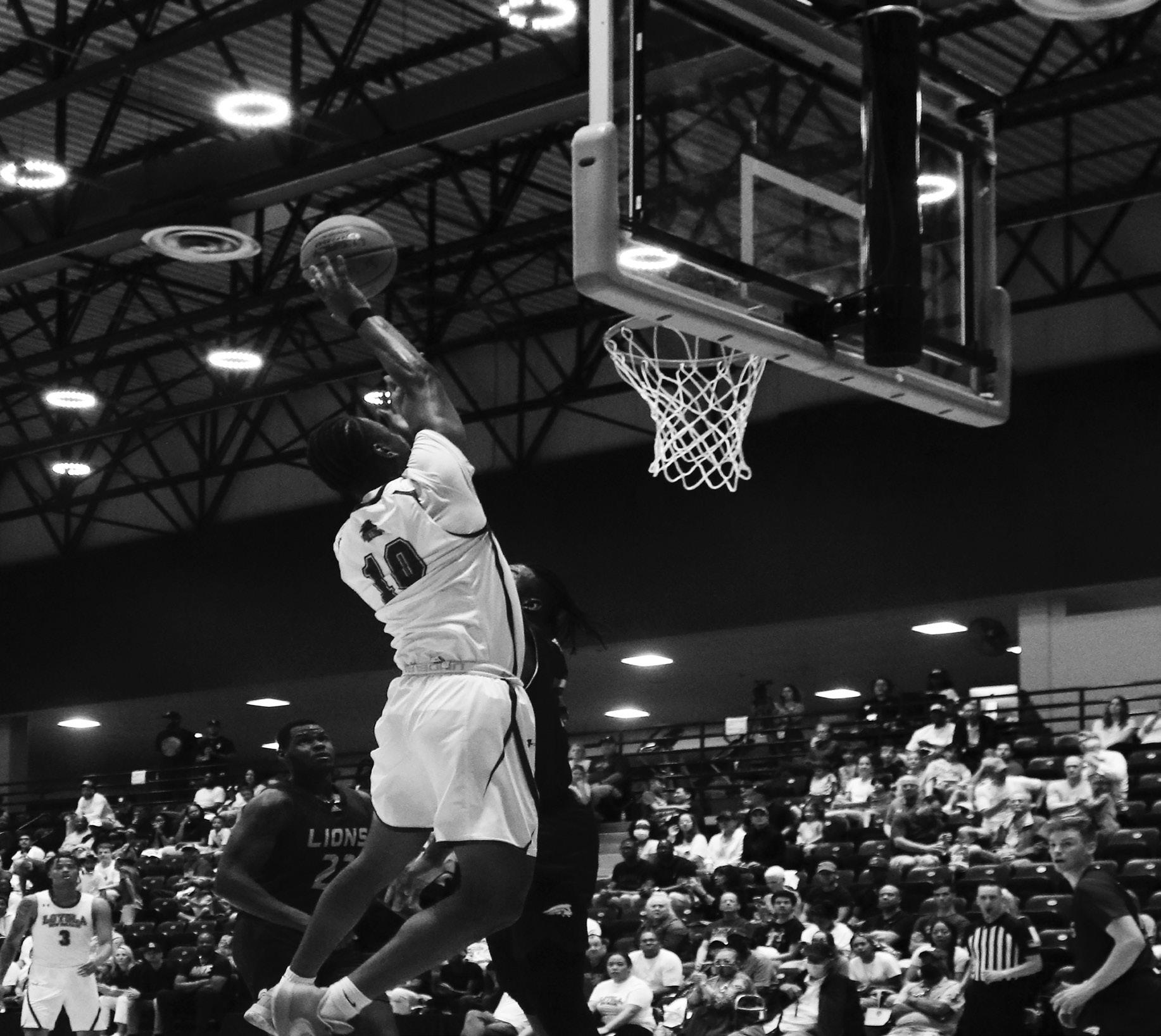
Harden averages about 13 points and 4 assists per game, which awarded him the Southern States Athletic Conference Newcomer of the Year award this season.
Senior forward Jalen Galloway led the team in scoring and rebounding with 18 points and 7 rebounds per game. Galloway was named first team all-conference and tournament MVP of the Southern States Athletic Conference Tournament.
On top of team achievements, firstyear head coach Donald Reyes received the SSAC Coach of the Year award this season.
“I’m extremely honored and blessed, but I wouldn’t be coach of the year without understanding that I didn’t play a single minute,” he said. “I believe that everyone in our program, this award is for them.”
The team also faced some adversity this season, having gone through multiple starting lineup changes, with multiple players returning from injury and redshirting, according to second-year assistant coach Javan Felix.
“This is a super blended group,” Felix said. “A group that has made an unbelievable level of sacrifice.”
WHAT YOU MISSED
MARCH 4
The beach volleyball team had a 5-0 victory over LaGrange College.
MARCH 5
The men's baseball team defeated Talladega College in a 11-9 victory.
MARCH 7
The men's baseball team loss a close 5-4 ballgame against Louisiana Christian University.
WHAT'S UP NEXT
SATURDAY, MARCH 11 @ 10 A.M.
Beach volleyball @ Bob Jones University
SATURDAY, MARCH 11 @ 12 P.M.
Men's baseball vs. BrewtonParker College
MONDAY, MARCH 13
Men's golf @ Day 1 Carey Collegiate
TUESDAY, MARCH 14 @ 12 P.M.
Men's and women's tennis vs. William Carey
TUESDAY, MARCH 14 @ 7:30 P.M.
Esports @ Blinn College (Overwatch)
Beach volleyball looks to improve second season
By Nadir Benslimane nmbensli@my.loyno.edu
The beach volleyball team started their second season with hopes to improve on the results from their first.

With their first win in the Sun Conference play against Florida Memorial University and St. Thomas University, the team is prepared to buckle down and train for their next victory.
“To prepare for matches, we spend time practicing hitting different locations and placing the ball in open areas,” said mass communication senior Brittany Cooper. “We work our different de-
fensive setups, serve receive, and get our eyes on the other team’s defensive setup.”
Beach volleyball head coach Robert Pitre said that the preparation the team does for any upcoming opponents occurs all the way up to the start of the match.
“Since video of our opponent is not easily accessible, most of our game plans depend on the opponents’ warm up,” he said. “Typically, we go into a match with a specific area of the court we would like to try to attack, a player from the other team that we would like to go after in serve receive, and an aspect of our game that we would like to perform the best
at.”
With this training, Pitre said he is determined to push the team toward victory in their conference.
“We have one goal for this season and that is to make it to the conference tournament,” Pitre said. “We have 11 teams in our conference and the top 8 make it. We only have one game against each team in the conference that counts towards our conference record.”
The team will play their next game on March 11 at 10 a.m. against Bob Jones University in Cleveland, Ga.
SPORTS 9 March 10, 2023 THE MAROON
Sophomore Preslie Boswell returns a shot against the University of Mobile on Feb. 11, 2023. The Wolf Pack split both meetings that weekend. Ryan Talley/The Maroon
(TOP) Graduate student Matthew Mondesir scores in the Wolfpack's 82-73 victory over the Faulkner Eagles, winning their second consective SSAC Championship. Maria DiFelice/The Maroon (RIGHT) Courtesy of Wolf Pack Athletics
Education is the cure to fake news
Media literacy is critical, especially now, as false information spreads like wildfire over digital platforms. It's easier now, more than at any other time in history, to access information, get live coverage of events, and stay informed about current issues.
However, the faster we’ve been able to access information, the harder it has become to fact-check and dispose of false information that travels alongside it.
Social media can be a powerful weapon for those who want to sow division and fuel chaos by spreading fake news. Maintaining division where facts cannot be agreed upon only helps reinforce false narratives and amplifies them in these insulated media echo chambers.
But it's not impossible to see through fabricated ideas – most of these false narratives begin by finding their desired conclusion and work backward to create a false impression of information. It's important not to buy into sweeping claims and partisan conclusions but use common sense to understand where that “fact” or “argument” came from. What facts and logical arguments support it? We can't just pluck off the leaves, we need to hit the roots.
Beneath the surface of vast media echo chambers is a dangerous, but defeatable, effort to attack facts, logic, and reason.
We need to share common facts and promote critical thinking and media literacy. Once we no longer have a factual common ground, we can no longer engage in democratic debate.
It's no secret that our inability to communicate with each other has been harmed by partisan media and specifically partisan right-wing media, which bears the ultimate responsibility for its divorce from reality. They have taken people who trusted them in good faith and led them into this mass hysteria about a reality of the world that does not exist. From soup to nuts, from false claims about open borders, rigged elections, and COVID-19 vaccines to vile claims of predatory behavior from minority groups.
The result of disinformation, or “alternative facts,” as the last administration had so cleverly coined, is creating a more dangerous world. People are feeling threatened. They’re lashing out because they’ve become paranoid and believe that these phony culture wars are going to kill them if they don’t act first. As the media becomes more rapidly weaponized by partisans, the role experts play
in protecting our personal interests cannot be understated. While disinformation runs rampant online, right-wing media has been swamped with conspiracy-driven content that disposes of the facts upon reporting the story. A common thread that unites the rightwing media ecosystem, from Alex Jones and One America News on the fringe to Fox in the mainstream, is a constant firehose of disinformation. We must be able to find reliable sources and experts and give them far more trust than we do television pundits – even if experts can still be wrong.
Anti-intellectualism is festering in American politics, most recently displayed by the manufactured outrage directed toward Dr. Anthony Fauci, who oversaw our COVID-19 vaccination efforts. As many vile conspiracies were hurled at him on fringe media channels, big broadcast companies like Fox News suggested Fauci was to blame for the virus and had a stake in the vaccine – even provoking people to stay away from taking the vaccine out of potential danger to human life. All the while, the network anchors knew they were lying (and took the vaccine themselves).

Likewise, if all the data shows that the 2020 election was not stolen, if every single independent investigation concludes there was no widespread fraud, and television broadcasters continue to contradict expert-verified evidence, we should be skeptical of that broadcast. And when those same anchors admit the conspiracy theories they’re peddling are lunacy, it should no longer be considered news.
It's important for news media to maintain a reputation of sincerity, a willingness to correct mistakes, and to carefully check the facts. It takes decades to build a reputation, but only hours to destroy one.
The danger that follows a lack of media literacy has been on display across America for the last several decades. When Fox News broadcasters promote extremist ideologies as mainstream talking points, they bear responsibility for the consequences that come with that.
It is astounding and necessary to address the fact every single extremist-related murder committed in 2022 was committed by a right-wing extremist. Engaging with this false belief that both parties are equally divergent from the “political center” is enabling the rightwing media to spiral into psychosis. We cannot gaslight ourselves.
Right-wing extremist ideologies that were promoted by major broadcast companies fueled the execution of nine Black churchgoers in Charleston, South Carolina in 2015, the 11 Jewish worshippers that were killed in Pittsburg in 2018, and the 23 Latinos that were killed in a Walmart in 2020 and 2021.
The Buffalo Topps grocery store shooter believed that there was a conspiracy to replace whites with nonwhite people. He bought into fabricated statistics from his 4Chan group chats that said Black people were an existential threat to white people.
The same great replacement theory was pushed by Fox News, with people like Tucker Carlson engaging in stochastic terrorism: telling his audience time and time again that there must be something done about “these people.” Yet when a terrorist actually does something, like shoot up a gay bar and say those people were child molesters, these broadcast personalities will stand back and say that isn’t what they meant – when in fact, it's exactly what they meant.
Now, someone like Tucker Carlson should be understood to simply not be serious. Dangerous, but not serious. And we can understand that by working on our media literacy, following the facts, engaging with different sources, listening to opposing perspectives, and assessing all the evidence – even if it contradicts our worldview.
Believing false information and buying into divisive rhetoric does require one to be predisposed to some cognitive defect. Remember Tim McVeigh had developed his delusional and paranoid right-wing extremist ideologies from a “sane and thoughtful mind" before deciding to kill 168 souls in the Oklahoma City bombing.
The effort to combat fake information and improve your media literacy should not focus on trying to prove every partisan talking point false on a case-by-case basis. According to Brandolini’s law, “the amount of energy needed to refute bullshit is an order of magnitude bigger than that needed to produce it.”
Ergo, there's a geyser of bullshit for people without common sense to feed on, and engaging in the fight will prevent you from engaging with real problems and getting shit done (which is precisely their point).
News literacy isn’t a matter of determining how news should fit into your political and moral compass. Rather, it's about being independently educated so as to not become another manipulated person that's driven by culture wars and partisan talking points. It's important not to lose sight of the important issues at hand, the things that affect our lives that are left unaddressed by manufactured cultural division. And education is our solvent.
For the neutral observers out there, it may seem like combating fake news in the digital age is as futile as Sysyphus trying to roll the boulder up the hill. But there are ways we can stay informed on the facts. Trying to expose every piece of false information that gets circulated is a never-ending battle that ultimately pushes us away from discussing the real issues.
We should instead require technology companies to invest in software that fights disinformation when it first spreads, we should make sure those same companies cannot profit off of the publication of fake news, and we should fund education on news literacy in schools and universities. And as individuals, we should continue to be skeptical about news sources and not rush to conclusions before verifying your claims. We should seek a diversity of sources and a diverse group of people to communicate with. We all have a responsibility to fight fake news, take it seriously, listen to the experts and promote news literacy. It takes a village –but we can do it.
HOWLS & GROWLS
HOWL to news literacy
GROWL to fake news
HOWL to long walks
GROWL to taxes
HOWL to Daylight Savings Time
GROWL to mosquitoes
HOWL to CGI artists
GROWL to AI
EDITORIAL BOARD
Macie Batson & Jackie Galli
Editors-in-Chief
Cristo Dulom Managing Editor for Print
Ava Acharya Managing Editor for Digital
Devin Cruice News Director
Maleigh Crespo Design Chief
Gabrielle Korein Photo Editor
Patrick Hamilton News Editor

Abigail Schmidt Life & Times Editor
Aron Boehle Worldview Editor
Matthew Richards Sports Editor
Mark Michel Opinion & Editorial Editor
Kloe Witt Breaking News Editor
Mia Oliva Reviews Editor Equity & Inclusion Officers
Victoria Hardy & Melody Newsome
Arianna D'Antonio Senior Staff Writer
Torrie Shuff Senior Staff Photographer Copy Editors
Heather Rabassa & Violet Bucaro
Bella Kelley Social Media Coordinator
Alexis Horton Assignment Editor
EDITORIAL POLICY
The editorial on this page represents the majority opinions of The Maroon’s editorial board and does not necessarily reflect the opinions of Loyola University.
Letters and columns reflect the opinions of the authors and not necessarily those of The Maroon’s editorial board.
The Maroon does not represent the opinion of administration, staff and/or faculty members of Loyola.
Letters are subject to editing for length, grammar and style. Please limit submissions to 400 words. Submissions are due no later than 4 p.m. the Sunday before publication. Please send all submissions — The Maroon, 6363 St. Charles Ave., Box 64, New Orleans, LA 70118. Email us your letters — letter@ loyno.edu.
Submissions may also be made online at www.loyolamaroon.com.
EDITORIAL March 10, 2023 THE MAROON 10
Abigail Schmidt/The Maroon
Assault jokes aren't funny
saulted. So, let me ask, what about that is comical? And how many people that make rape and assault jokes have ever personally experienced sexual assault? I assure you if you had, you would not find it so funny.
chance that your assailant will walk free.
Survivors that do decide to report are often re-traumatized by police, healthcare professionals, their family, their friends, their lawyers, and their peers.
In his first comedy set since admitting to sexual harassment allegations, Louis C.K. decided it was the perfect time to make a joke about sexual assault, highlighting the warped belief system that lies beneath these “harmless jokes.”
Rape is not funny. Diminishing the worst moments of someone’s life down to a bite-size bit for your comedy routine or your locker room joke session is not silly or goofy. You are the problem.
Rape is an epidemic worldwide, but especially in the United States. According to RAINN, the Rape, Abuse & Incest National Network, every 68 seconds, an American is sexually as-
Rape and assault are all about power and control. The act robs people of power over their choices and control over their bodies. What kind of person do you have to be to find that entertaining?
Rape jokes are not dark humor or witty. And I’m not just “being sensitive” for not laughing at your insensitivity. They are proof of something fundamentally wrong with how our society views rape and assault. To think that this act of dehumanization is at all funny or light-hearted instead of tragic and savage is mind-boggling.
Survivors of assault already face a myriad of challenges after rape has taken place. There is victim blaming, mental and physical health issues, police reports, court, and a very high
Rape is so normalized in our culture today that people have become too comfortable with the idea of assault. Assault shows up casually in TV shows like Bridgerton and The Magicians. It shows up in the lyrics of Top 40 Hits. It shows up in Oscar-winning films. It is depicted in advertisements from major companies like Dolce and Gabbana. Media has found a way to make rape sexy rather than savage.
This normalization of rape and rape culture has led to serious consequences for survivors who face courtrooms of desensitized jurors and judges.
If rape is funny, society does not have to be as harsh in its punishments for rapists. If rape is funny, people do not have to worry about survivors’ mental, emotional, and physical health. If rape is funny, survivors do not need as many government-funded resources. If rape is funny, then it is one less thing to care about.


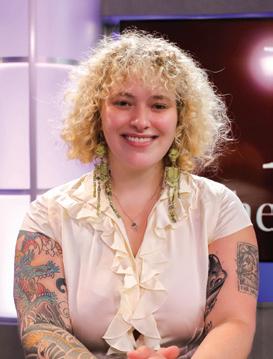
So, to all those that still make rape jokes in 2023, I would say shut the fuck up.
EV charging stations help Loyola serve the environment

grid.
Here’s a little math to show you what I mean. A gallon of gas creates 43 percent more carbon dioxide emissions than the comparable amount of electricity generated by natural gas — which is where most of Entergy’s generation in the evening comes from.
increasing share in the coming years as prices continue to come down.
Cost is another sore subject. I know there are a lot of misconceptions about the upfront costs of EVs, but EVs aren’t just for the rich and privileged. EVs aren’t just pricy and flashy Teslas anymore.
As one of a handful of electric vehicle drivers on campus, I was excited to see the new dedicated charging spaces pop up across campus this week.
EV charging stations aren’t new to Loyola. We have had a few charging spaces on the main campus since 2011. Those level 2 chargers are still in the Horseshoe, but now they have been supplemented with 11 additional level 1 charging spaces spread throughout campus.
As I have been excitedly talking about these charging stations to people on campus, I have been met with a curious chorus — ranging from indifference to resentment.
But resenting an EV parking space is thinking about it all wrong.
An EV parking space is not a giveaway that you are being left out of. It is an investment in climate change.
Because they are still relatively rare, most people just don’t understand EVs, so let me explain a little about them.
First, I have had my EV since 2018, and I can assure you, I have never run out of charge on the side of the road. Range anxiety is understandable because it is still a new technology, but once you drive an EV, you will quickly learn that there are more than enough places to charge, and you typically have more than enough power when you need it.
Second, charging an EV during the day isn’t about trying to get Loyola to buy us gas. No, charging during the day is about generating less CO2 emissions, specifically by shifting the time of day that the vehicle is charged.
Charging during the day is about reducing the carbon impact for everyone — and reducing the stress on the power
On the other hand, if the vehicle is charged during the day, when more of that electricity comes from renewables because solar power is being generated —the carbon impact is even smaller.
Charging at Loyola is not about saving money. Each time someone plugs in to one of Loyola’s EV spots, they are getting just a few dozen cents worth of electricity. If this was about saving money, the best move would be to just forego the parking pass, park off campus, and just charge at home.
EVs make a huge difference in our carbon impact, and charging them during the day, rather than in the evening, multiplies their impact for the whole planet.
Installing these EV charging spaces is a visible and meaningful way Loyola is able to make an investment in decarbonization every day.
Why does it matter that it is visible? Well, recruitment, for one.
The Association for the Advancement of Sustainability in Higher Education conducted a survey that showed that 85 percent of incoming college students say it is at least somewhat important for their campus to prioritize sustainability, with 45 percent saying they considered environmental sustainability in their enrollment decisions.
By putting those spaces front and center, Loyola is showing its concern for the environment.
And EV spots are going to play an increasingly important role. That is because EV sales grew by two thirds in 2022 in the U.S., and are expected to continue to make up an
Nowadays, you can buy perfectly fine electric Chevys, Toyotas, Hyundais, and more, and many of them are priced competitively with other new vehicle models. If you buy the vehicle new, you can get a $7,500 federal tax credit to bring the price even further down.
OK, sure, new vehicles, by their very nature, price most people out of the market. But since the Inflation Reduction Act, even used EVs qualify for tax credits. So, for example, you can get a 2013 Nissan LEAF all-electric for less than $10,000, and that is before the $4,000 tax credit.
Of course, everyone can’t purchase a vehicle. That is true whether you are talking about an EV or not. But the misconception that all EVs are luxury brands for the bougie is just an outdated idea.
I will admit that having these new EV charging spots in such prominent places on campus is a bit embarrassing. I, along with the other EV drivers on campus, would have been more than happy to have them installed on the seventh floor of West Road, out of the way of everyone else.
But the university decided to make a public and visible commitment to the environment, and I salute that.
If you are grumpy about not having enough parking, don’t take it out on a good cause, like decarbonizing the economy. Take it out on all the Tulane students who are buying our parking passes.
I think we can all agree that green cars are better than Green Waves anyway.
OPINION 11 March 10, 2023 THE MAROON
Mass communication senior gfkorein@my.loyno.edu
GABRIELLE KOREIN
Abigail Schmidt/The Maroon
“An EV parking space is not a giveaway that you are being left out of. It is an investment in climate change.”
MICHAEL GIUSTI Director of Student Media mdgiusti@loyno.edu
“Diminishing the worst moments of someone’s life down to a bite-size bit for your comedy routine or your locker room joke session is not silly or goofy.”
An electric car is getting charged up on Loyola's campus. Loyola has set up 11 additional charging stations like this one. Maleigh Crespo/ The Maroon



M Y CM MY CY CMY K Full page color - 10.5w x 14h.pdf 1 2/18/22 11:10 AM
























 By Sofia Mongillo smmongil@my.loyno.edu
By Sofia Mongillo smmongil@my.loyno.edu





 By Jane Wright jswrigh2@my.loyno.edu @janewriight1
By Jane Wright jswrigh2@my.loyno.edu @janewriight1










